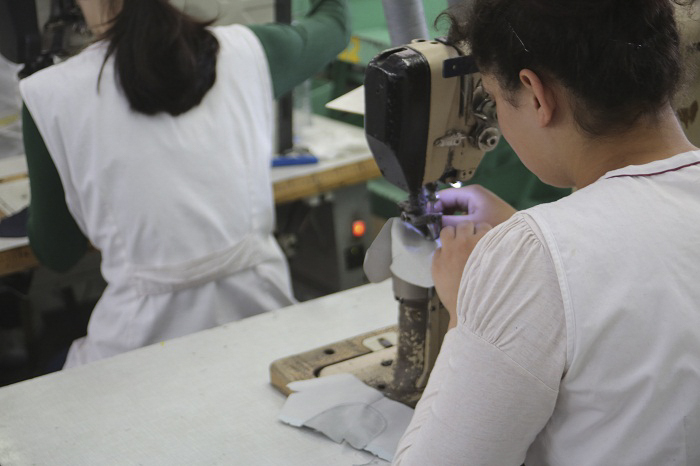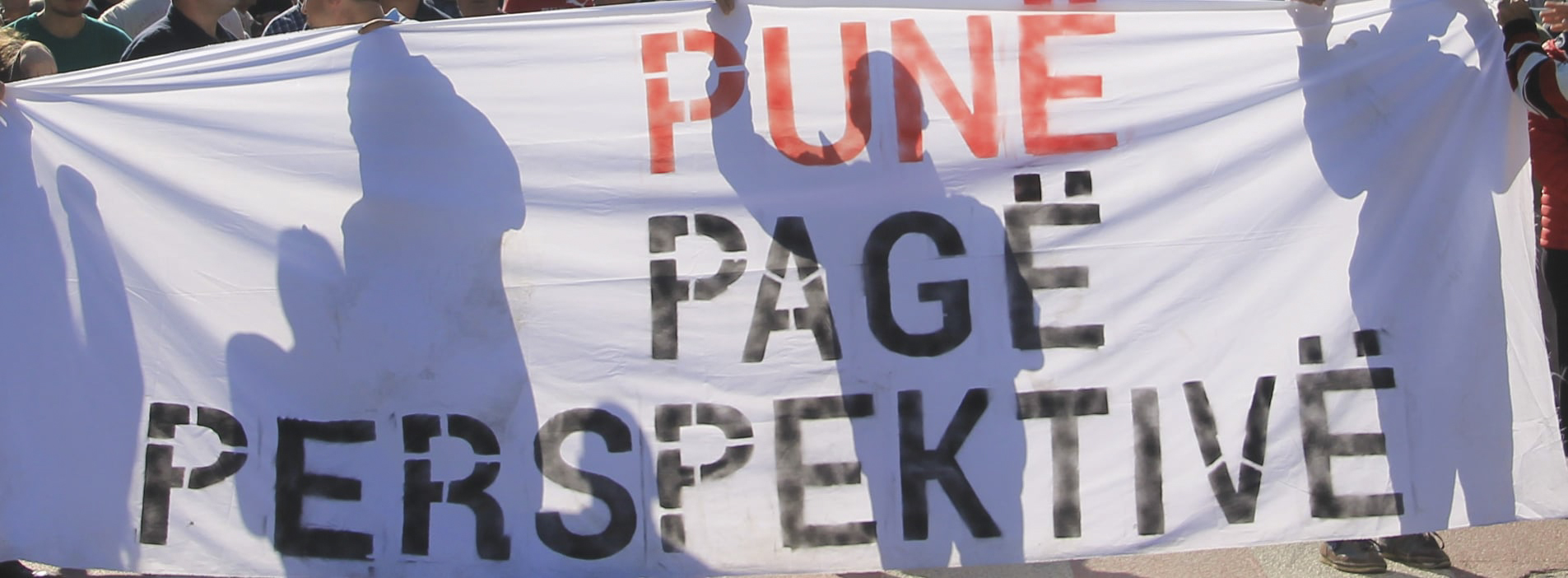The year 2020 will, of course, be remembered for the pandemic — the fears and uncertainty, the lockdowns and restrictive measures, and the countless personal struggles and conflicts we’ve endured as we’ve sought to cope with an imposed lack of freedoms.
However, not even in times like these have the rebels across the region taken a back seat.
They have refused to give up on protesting or speaking out in public, fighting legal battles or various other forms of exercising democracy in practice — fighting for rights and liberties for all. Undaunted, they have continued to challenge those in power, seeking accountability and above all, demanding change.
In order to learn what motivates citizens across the region to take the lead in the fight against various injustices, K2.0 has identified six rebels living around us in the region. They are the people who stand firm against the many absurdities of life in the Balkans and continue the fight, often with the odds seemingly stacked against them and in the face of personal threats and abuse.
Of course, there are many more rebels, as reasons for dissent are endless. But those selected for this series represent a diverse group of individuals and issues; people who have taken one step further, mobilized others and found a way to achieve change in their respective fields.
K2.0’s rebel from Albania, Ferdez Onuzi, is a feminist activist ans a member of the trade union movement in Albania as part of Organizata Politike (The Political Organization). She was born in 1993 in the town of Kukës and from an early age was molded in an environment where the Balkan politics of the ‘90s played an essential role.
Finding herself in Kosovo along with her family immediately after the NATO bombing campaign, Ferdez grew up with a sense of solidarity and the desire for a world where peace and social justice prevail. Instead of borders, she seeks to build bridges and — over scorched earth — to jointly lay the foundations for a new society: One that is more hopeful, more equal and more generous. Ferdez seeks a way toward the contextualization of such a reality through the organization of the working class in trade unions because according to her, radical change can only come from people joining together and the reaction of those who experience oppression throughout their existence.
Kosovo 2.0: What is your earliest political memory?
Ferdez Onuzi: My grandparents’ conversations at home about the Kosovo war. One evening, someone knocked on the door to return a box of my uncle’s clothes and to tell us that he had joined the liberation movement in Kosovo. Dashnor Onuzi, then in his 30s, had not had the time or opportunity to let his family know that he was going to war, which filled us all — including myself — with a sense of anxiety and uncertainty.
Thankfully, he came back home, which was a very special moment for me because we were very close. I remember when my uncle showed up at the doorstep, everyone jumped up to hug him with tears of joy. Whereas I wanted him to approach me first, as per usual, to hug and pick me up, that’s how we made up for lost time. However, he was reluctant to approach me and this was because he could not hug me: A grenade had injured his arms and one leg.
The war had manifested itself on my uncle’s body and my grandparents’ distress. It manifested itself even more in the eyes of two families from Kosovo who took refuge in our house that only had two rooms and a kitchen; in the silence that dominated whenever the windows were shaken by bombs at the border, very close to the neighborhood where we lived. An imaginary border that separated war from peace, danger from defense, fear from hope and the present from the future.
“Ku është Ukshin Hoti?” (Where is Ukshin Hoti?) is possibly the first thing I read after the primer.
This border stopped being imaginary when, in November 1999, my family and I found ourselves in front of the UNMIK International Troops Coordination in Morina, with the aim of getting to Prizren, where I would live until 2009. This city — which was not considered to be a conflict zone anymore, despite the regular tank patrols, presence of foreign military troops, unrest and curfew — is where I would learn the Albanian language and how to read it, specifically at the Abdyl Frashëri elementary school, and I would practice it with my father [by reading inscriptions] on walls. “Ku është Ukshin Hoti?” (Where is Ukshin Hoti?) is possibly the first thing I read after the primer, and my father’s explanation about these graffiti was my first “out of class” conversation.
I feel that it was precisely this very intense atmosphere, full of confusion, uncertainty, fear and also curiosity, that influenced my formation and later acted as an impetus for my political engagement. Stories about the rape of women (and men) as an instrument of war by the Milošević regime; the mourning for missing persons and the open wounds of a people who survived war, ethnic cleansing, consecutive protests and powerful slogans.
They all transformed into an inseparable part of who I am, driving me to learn why war exists; why our societies are the way they are; what do we lack in order to be happy, self-sufficient and healthy? Does the problem lie with “the other” or with a system that creates “the other” as an a priori dehumanized category used as a scapegoat for camouflaging ignorance and, consequently, hatred and oppression?
How much did your undergraduate studies help to find the answers to these questions?
My undergraduate studies were only of partial help. I chose philosophy as my major in order to specialize in political theory later on so that I could dig deeper into the reflections of a more complex and challenging sphere of thought. I felt that in addition to the practice of civic mobilization and organization, specifically that of workers, and my personal experience, knowledge would allow me to call phenomena by their names so that I could reach the truth, and the right solutions, faster.
Our social and economic position also determines our position in the wider social circle.
Yet, universities today serve the market rather than knowledge, let alone critical thinking. Instead of offering an agora where thoughts and ideas are examined, the university is a factory that produces diplomas and obedient citizens who never bother questioning their personal and social reality — thus perpetuating the structures of oppression. Departments such as philosophy and political theory particularly tend to graduate people who end up unemployed and quote Aristotle.
How did you come to choose it then?
Because of my idealism, of course. But also because for me, a personal requirement was the non-negotiable wish to attend university in Tirana. As a girl from the suburbs, coming from a poor working-class family, which sought to extend patriarchal authority to every sphere of my life, intimacy and high school. The Tirana I dreamed of, idealized and even exoticized, meant liberation and independence. I believed that the capital would confront me with many strangers and gradually, such a thing would help me know myself — my potential and my limits.
Later I would understand that simply being in Tirana was not enough. Our social and economic position also determines our position in the wider social circle and even the way you are welcomed in a large and chaotic metropolis like Tirana; which in reality is wary of local foreigners, the ones who intermix standard Albanian with dialect, who do not have the money to fit in with the faux glow of the shop windows, behind which cheap replicas of world brands are exhibited and where we are required to be superhuman in order to survive.
The biggest challenge is to overcome this fear in the family, in the first structure of oppression.
To work two shifts while we get an education; to overcome the stereotypes that are violently and unjustly imposed on us; to not raise our voices about the low wages, disdain, sexual harassment at the workplace and the abuse on the concrete roads of a city that shatters as many dreams as it creates.
What does activism mean to a young woman like yourself?
To paraphrase Simone De Beuvoir and transport her sentiment into a public and civil policy-making context: One is not born, but rather becomes, an activist — the same goes for womanhood. The world is different for women and girls because they are excluded from it before they are born, or they are educated from an early age to exist only in the private sphere, where the entire process of social reproduction falls upon their shoulders.

Ferdez Onuzi believes that inclusive changes in society will come from the working class, especially from women like her mother, who works in the textile industry and serves as an inspiration for her activism. Photo courtesy of Ferdez Onuzi’s archive.
Suburban girls in particular grow up in fear: The fear of their father or any other male figure in the family; the fear of other men outside the house, of classmates, of the neighborhood, later their husband, brother-in-law, father-in-law, of every patriarchal and authoritarian figure who robs them of their freedom and spirit. The biggest challenge is to overcome this fear in the family, in the first structure of oppression. From there, every step taken will be safer and more promising. Raising your voice, demanding your rights, rejecting violence becomes a philosophy and a practice of life. These are important because what does life in servitude mean?
If we, the common people cannot decide for our future, nobody else can do it in our stead because nobody else understands our needs better than ourselves.
Getting to this rebellious point, which then determines the course of everyone’s life, is different for every woman and girl. It came to me around the same time as my engagement as an activist in the public sphere. In 2014 I was introduced to the “Për Universitetin” (For the University) movement. The movement had just been established and the student activists had started organizing the first roundtables. I was enticed by this voluntary organization and especially by the skill of the female activists. I saw myself as part of this group, just like the other girls, and quickly, I joined them. But my family found it difficult to share the same vision and worldview with me.
“It’s not your place to deal with stuff like this. Politics is for other people!” — they would say all the time. But what does “doing politics” mean and who is entitled to it? “Leadership belongs to someone else,” my parents would continue to patronize me, from the position of a family that was historically poor and oppressed, stripped of every bit of power. I thought differently. I thought that people like my parents, like my mother who is a textile industry worker and my father who works at a highway gas station; my friends and I who come from similar backgrounds — all of us, if not “leadership” itself, we are the potential for leadership.
We carry all of society on our shoulders, just like my mother who holds our home together after finishing work. If we, the common people (that in fact make up the vast majority of the people) cannot decide for our future, nobody else can do it in our stead because nobody else understands our needs better than ourselves.
I have in mind the women of Ballsh working in the oil industry, who are an inspiring example and embody a real potential for societal change.
As a workforce that generates income for an entire society through poorly paid jobs and at the same time — the unpaid work of women in the private sphere — we belong to the public space, through our personal space, which is a reflection of a failed system. In fact, the pandemic has proven this to the letter.
What makes trade union organization special?
The fact is that solidarity comes naturally to workers — maybe also because heavy work requires cooperation, communication and a sort of fellowship; not only to move forward with work, but also to ensure protection and to triumph over structures in order to sacrifice more easily when alone. Here, I have in mind the women of Ballsh working in the oil industry, who are an inspiring example and embody a real potential for societal change. They are not only refinery workers but also friends who share worries, joys, sorrows, fears, insecurities, dreams and the ideal of a better world for them, their families and our entire society. It was precisely this natural spirit of solidarity between them that enabled a successful hunger strike, guaranteeing all the workers and refinery workers sufficient income, at least, until their next action.

“Work! Pay! Perspective,” were the repeated calls of Ballsh oil industry workers during the protests for better working conditions last fall. Photo courtesy of the Political Organization’s archive.
On the other hand, women miners, who were often found without any support and perspective in a city like Bulqiza, which offers nothing but misery. They have managed, thanks to the solidarity between them, especially in the case of widows, not only to survive, but to keep an entire city alive. Yet, these women are rarely mentioned. For many it may still be a surprise that in Albania there are miners but there are also miners who work in the mine for 8 hours and then at home, without any schedule at all.
I am of the opinion that sweeping changes in our society will come when the working class, especially all working women, like my mother, will overcome the fear that still keeps them paralyzed. Being aware of their unmet needs, of denied rights and stolen freedom; they will rise to fulfill their social role, that of taking the reins of life in their hands. And we, their daughters and friends, will stand by them, being courageous along with them.
You are an inspiration and a role model for every woman and girl in our society thanks to your strength, intelligence and maturity. Have you had a similar role model during your upbringing?
Creating such an expectation in others is a heavy burden on their shoulders, regardless of flattering egos. But I really hope that through my work I manage to encourage the girls and women of our societies to see themselves detached from patriarchal pressure all around, for all that they really are and can achieve.
In my life, I have been inspired by women whose lives have not necessarily been success stories, but their knowledge and leadership have paved the way for overcoming social abyss. Such a woman is the one who has brought me to life, my mother. Her level of awareness of the current position and conditions where she has always been, as well as my drive and determination to become different from her, has proven to me that in fact, today, I have come this far thanks to her resistance and that for me it is pride — to inherit that resistance and give it a further boost.
Another powerful woman is my uncle’s wife who was very young when we met. She taught me about virtues, goodness, righteousness and honesty. Not as an entitlement of the husband and the absurd concept of virginity, this patriarchal remnant, but for honor as a force to be honorable to oneself.
It is for these reasons that I think trade unionism should be supported: Because only collective structures that are molded in solidarity, manage to create space for everyone to triumph and consequently, to pave the inspirational path for others to come later. Such organizations pass the test of time and women like my mother or uncle’s wife (this woman whose company I gained somewhat late in life) create a safe space for them to express and act. And their word and activity are the hope of all of us for a new, free and equal world.K
Feature image courtesy of Ferdez Onuzi’s archive.



